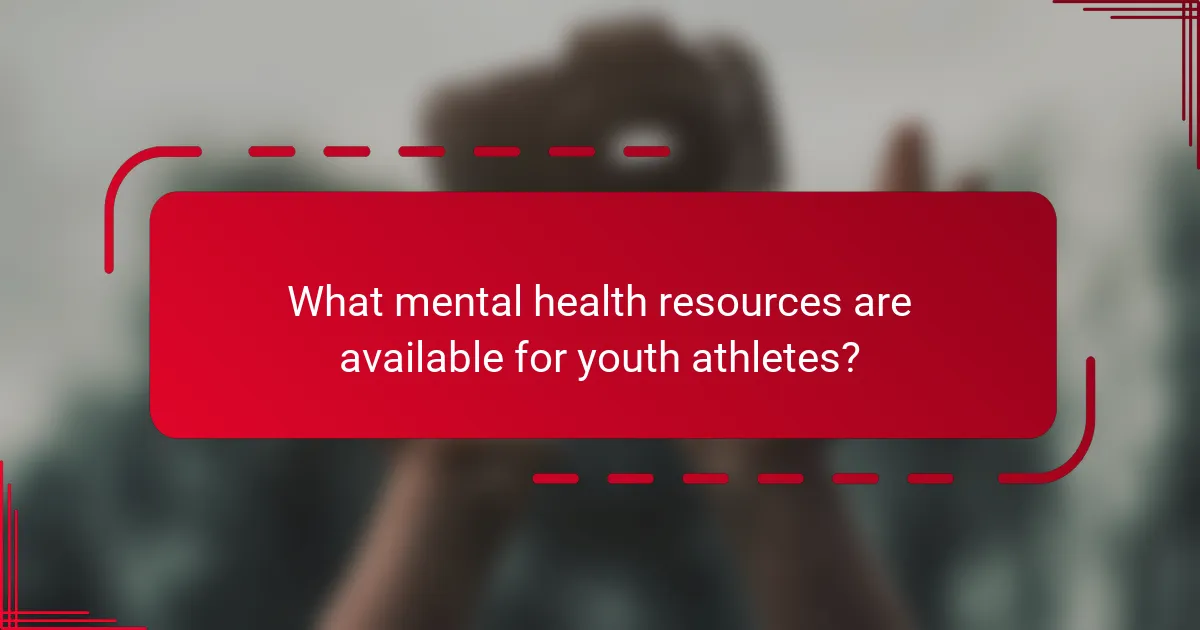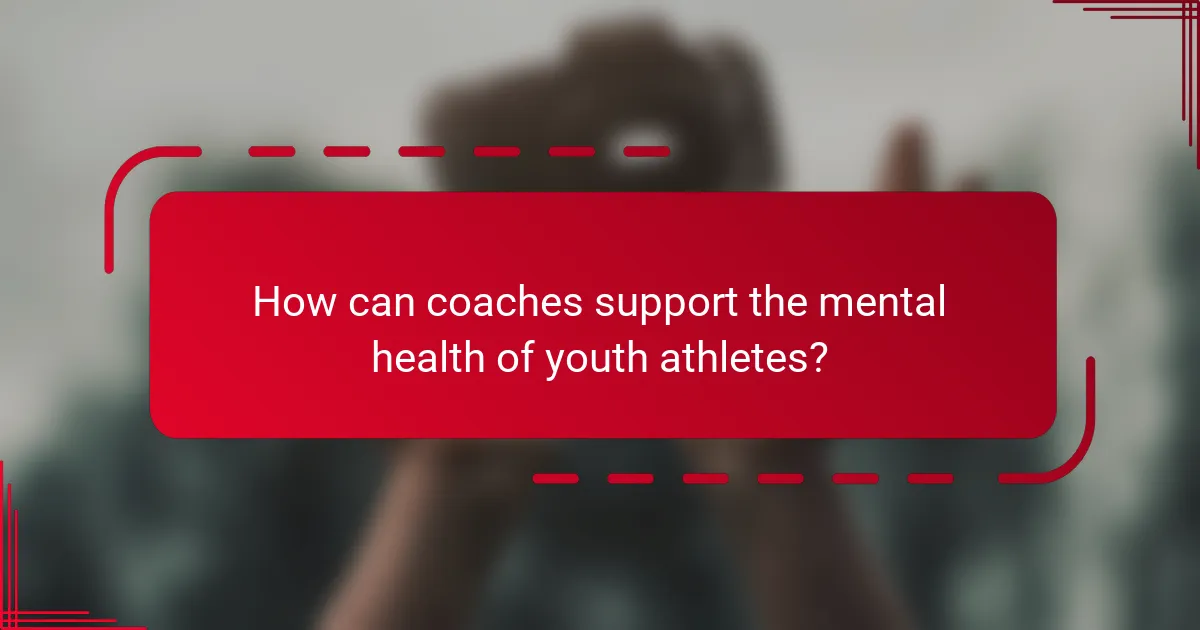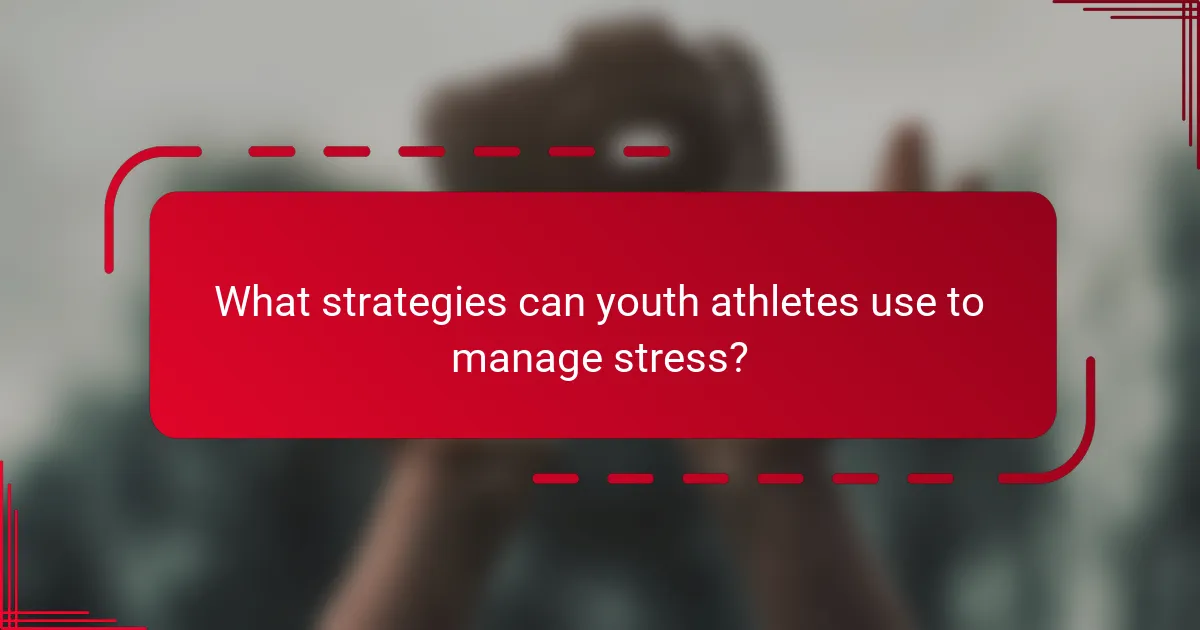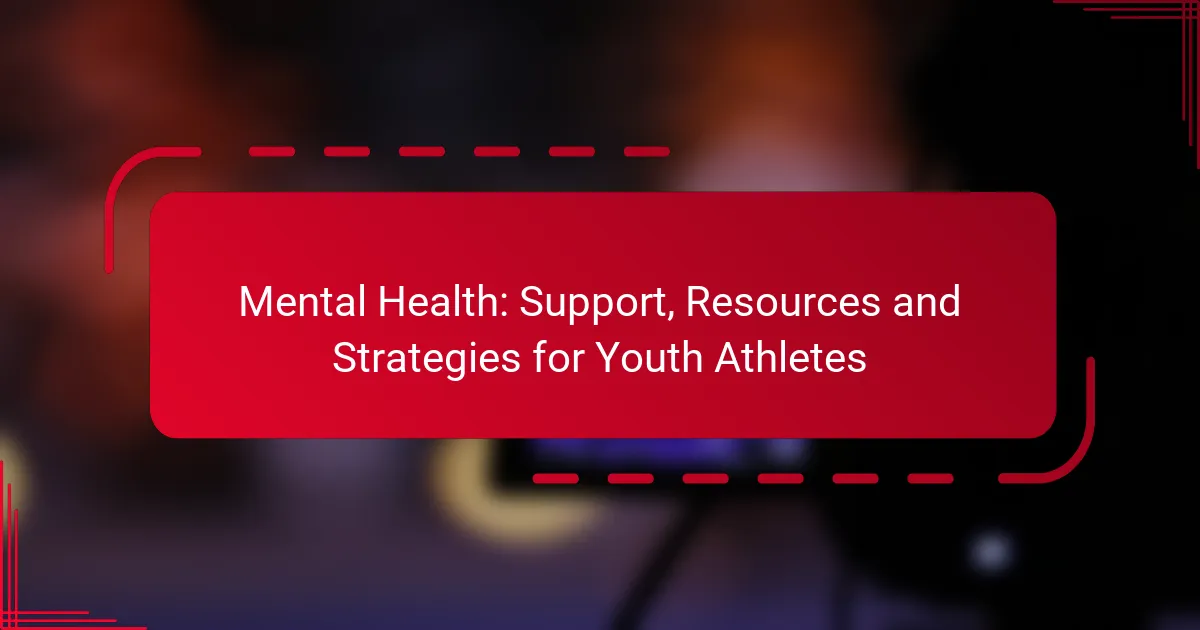Mental health is a crucial aspect of overall well-being for youth athletes, who often face unique pressures in their sports journeys. Access to a range of resources, including counseling services and supportive communities, can help them navigate these challenges. Coaches also play a vital role by creating a positive environment and encouraging open communication about mental health. By incorporating effective stress management strategies, young athletes can enhance their resilience and performance both on and off the field.

What mental health resources are available for youth athletes?
Youth athletes have access to a variety of mental health resources designed to support their emotional well-being. These resources include national organizations, local services, and online platforms that provide guidance, counseling, and community support tailored to the unique challenges faced by young athletes.
National Alliance on Mental Illness (NAMI)
The National Alliance on Mental Illness (NAMI) offers extensive resources for youth athletes, including educational materials, support groups, and crisis intervention services. Their programs focus on raising awareness about mental health issues and reducing stigma, which is crucial for young athletes who may feel isolated in their struggles.
NAMI provides a helpline that can connect youth athletes and their families with local services and support networks. They also host events and workshops that promote mental health education and resilience among young athletes.
American Psychological Association (APA)
The American Psychological Association (APA) offers resources specifically aimed at youth mental health, including articles, research, and guidelines for athletes. Their website features tools for understanding anxiety, depression, and stress management, which are common issues faced by young competitors.
Additionally, the APA encourages athletes to seek professional help when needed and provides a directory of licensed psychologists who specialize in sports psychology. This can be an invaluable resource for athletes looking to enhance their mental performance and overall well-being.
Local community mental health centers
Local community mental health centers provide accessible services for youth athletes, including counseling, therapy, and support groups. These centers often offer sliding scale fees based on income, making mental health care more affordable for families.
Many community centers also have programs specifically designed for youth, addressing issues like performance anxiety and peer pressure. Engaging with local resources can help athletes build a support network within their community.
School counseling services
School counseling services are a critical resource for youth athletes, as they provide immediate access to mental health support within the educational environment. Counselors can help students navigate stress related to sports, academics, and personal life.
Many schools offer workshops and seminars focused on mental health awareness, resilience training, and coping strategies. Athletes should feel encouraged to utilize these services, as they can foster a healthy balance between sports and other life demands.
Online support groups
Online support groups offer youth athletes a platform to connect with peers facing similar challenges, providing a sense of community and shared experience. These groups can be found on various social media platforms and dedicated mental health websites.
Participating in online forums allows athletes to discuss their feelings and experiences anonymously, which can be particularly beneficial for those who may be hesitant to seek help in person. It is important to ensure that these groups are moderated and provide a safe environment for open dialogue.

How can coaches support the mental health of youth athletes?
Coaches can significantly support the mental health of youth athletes by fostering a positive environment and providing resources tailored to their needs. This involves implementing training programs, encouraging open communication, and being vigilant about signs of mental distress.
Implementing mental health training programs
Coaches should consider integrating mental health training programs into their regular coaching curriculum. These programs can include workshops on stress management, resilience building, and coping strategies, which are essential for young athletes facing competitive pressures.
Utilizing resources from local sports organizations or mental health professionals can enhance these training sessions. For instance, programs that focus on mindfulness techniques or team-building exercises can improve both mental well-being and performance.
Creating an open communication environment
Establishing an open communication environment is crucial for youth athletes to feel safe discussing their mental health. Coaches should encourage athletes to share their feelings and experiences without fear of judgment or repercussions.
Regular check-ins and one-on-one meetings can facilitate this dialogue. Coaches can ask open-ended questions and actively listen to athletes’ concerns, reinforcing that their mental health is just as important as their physical performance.
Recognizing signs of mental distress
Coaches must be trained to recognize signs of mental distress in their athletes, such as changes in behavior, mood swings, or withdrawal from team activities. Early identification can lead to timely support and intervention.
Common indicators include decreased motivation, increased irritability, or a drop in performance. Coaches should be observant and proactive, offering support or referring athletes to mental health professionals when necessary.

What strategies can youth athletes use to manage stress?
Youth athletes can effectively manage stress through various strategies that promote mental well-being and resilience. Techniques such as mindfulness, time management, and regular physical activity can help them cope with the pressures of competition and training.
Mindfulness and meditation techniques
Mindfulness and meditation can significantly reduce stress levels for youth athletes by helping them focus on the present moment. Simple practices, such as deep breathing exercises or guided imagery, can be incorporated into their daily routines.
For instance, spending just a few minutes each day practicing mindfulness can enhance concentration and emotional regulation. Youth athletes can try apps or online resources that offer short meditation sessions tailored for beginners.
Time management skills
Effective time management is crucial for youth athletes to balance training, schoolwork, and personal life. Creating a weekly schedule that allocates specific time blocks for each activity can help them stay organized and reduce feelings of being overwhelmed.
Prioritizing tasks is essential; athletes should focus on completing high-priority assignments first. Using tools like planners or digital calendars can aid in tracking deadlines and commitments, ensuring they maintain a healthy balance.
Physical activity and exercise routines
Regular physical activity is not only vital for athletic performance but also serves as a powerful stress reliever. Engaging in a variety of exercises, such as running, swimming, or team sports, can boost mood and reduce anxiety levels.
Incorporating rest days into their training schedules is equally important to prevent burnout. Youth athletes should aim for at least 30 minutes of moderate exercise most days of the week, while also allowing time for recovery and relaxation.

What role do parents play in supporting youth athletes’ mental health?
Parents play a crucial role in supporting the mental health of youth athletes by fostering a positive environment that encourages emotional well-being. They can help by being attentive to their child’s feelings, promoting healthy habits, and recognizing when professional assistance may be necessary.
Encouraging open discussions about feelings
Open discussions about feelings allow youth athletes to express their emotions and concerns without fear of judgment. Parents should create a safe space for these conversations, actively listening and validating their child’s experiences. Regular check-ins can help normalize discussions around mental health.
To facilitate these conversations, parents can ask open-ended questions like, “How did you feel during practice today?” or “What challenges are you facing in your sport?” This approach encourages athletes to share their thoughts and feelings more freely.
Promoting a balanced lifestyle
A balanced lifestyle is essential for maintaining mental health in youth athletes. Parents should encourage a mix of sports, academics, and leisure activities to prevent burnout and promote overall well-being. This balance helps athletes develop skills outside of their sport and fosters social connections.
Setting reasonable expectations regarding training and competition can also alleviate pressure. Parents should emphasize the importance of rest, nutrition, and hobbies, ensuring their child has time to unwind and recharge.
Seeking professional help when needed
Recognizing when to seek professional help is vital for supporting a youth athlete’s mental health. Parents should be aware of signs such as persistent sadness, anxiety, or changes in behavior that may indicate the need for external support. Engaging with a mental health professional can provide tailored strategies to address these issues.
When considering professional help, parents can start by consulting with school counselors or sports psychologists who specialize in youth athletics. These professionals can offer valuable insights and coping strategies, ensuring that the athlete receives the appropriate care.

How can schools integrate mental health education for athletes?
Schools can effectively integrate mental health education for athletes by incorporating structured programs that focus on awareness, resources, and coping strategies. This approach not only supports athletes’ mental well-being but also fosters a culture of openness and understanding around mental health issues.
Incorporating mental health workshops
Implementing mental health workshops is a practical step for schools to educate athletes about emotional well-being. These workshops can cover topics such as stress management, anxiety reduction, and the importance of seeking help when needed.
Workshops should be interactive and tailored to the specific needs of athletes. For example, schools might invite mental health professionals to lead discussions or conduct activities that promote resilience and coping skills. Scheduling these workshops during pre-season training or regular team meetings can enhance participation.
Additionally, schools should consider providing resources such as handouts or online materials that athletes can refer to after the workshops. This ensures that the information is accessible and reinforces the lessons learned during the sessions.
